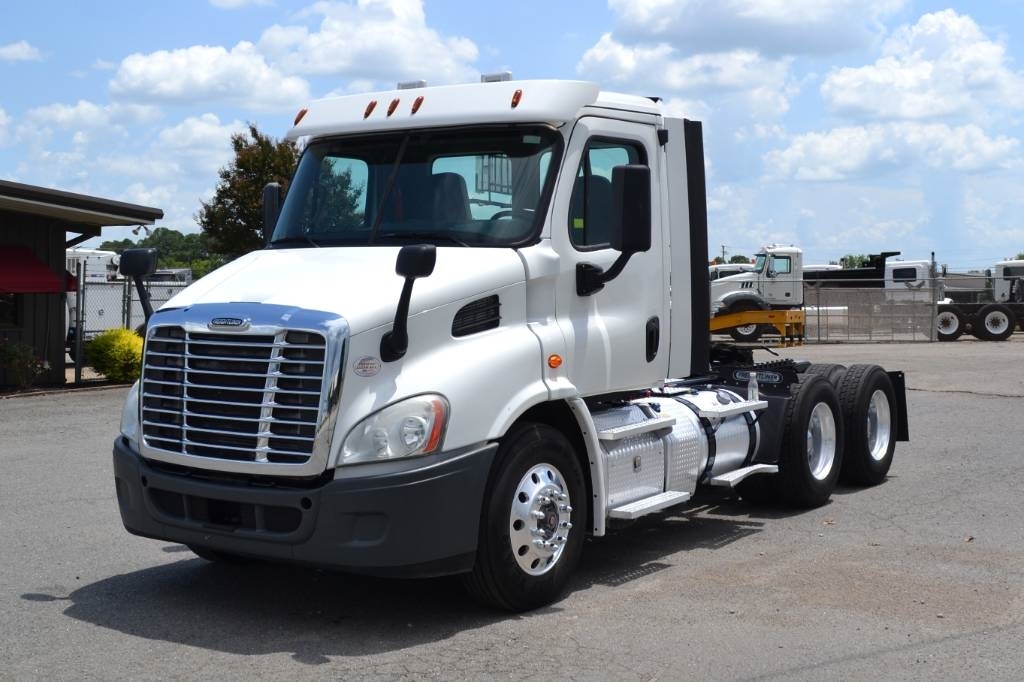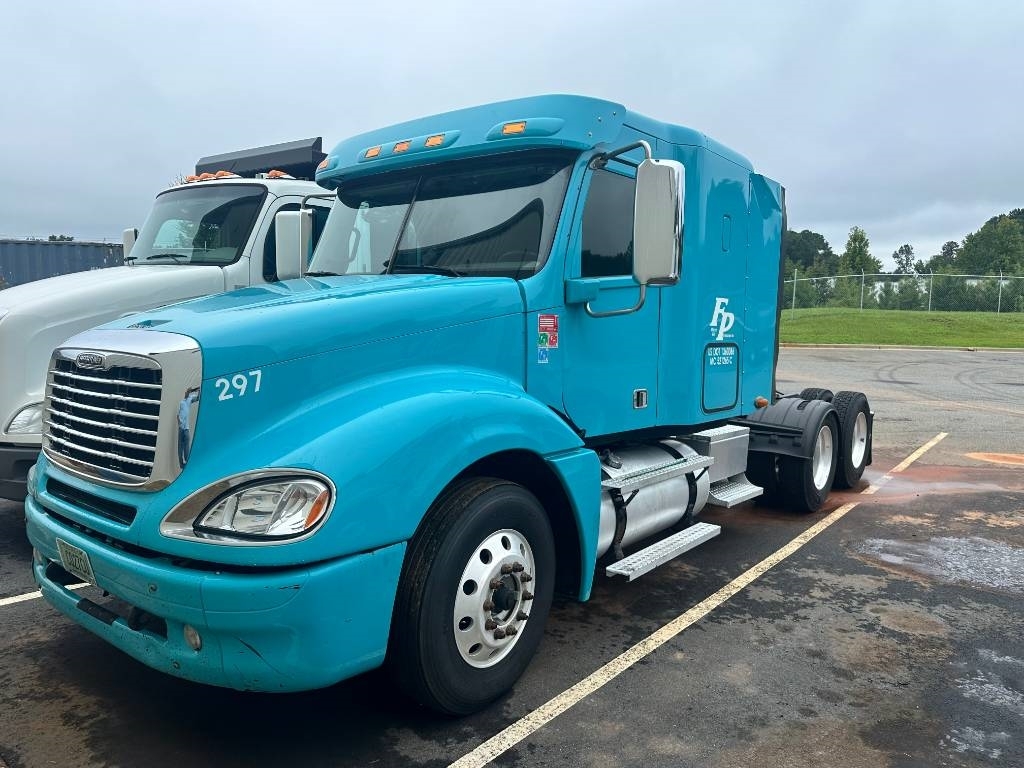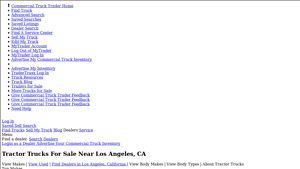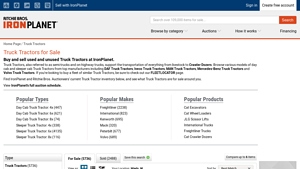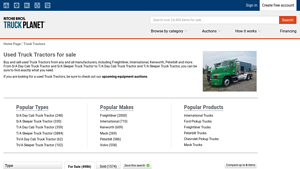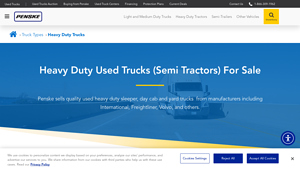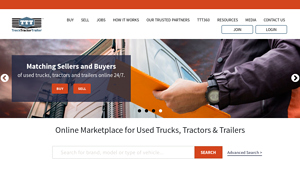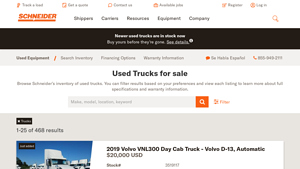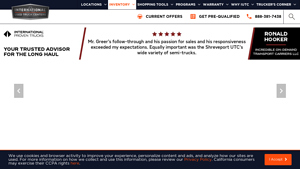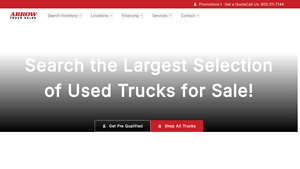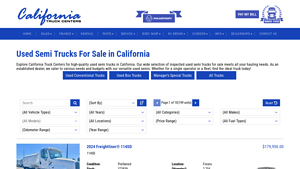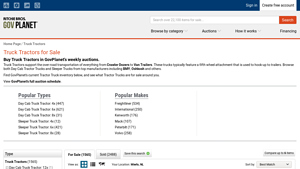Introduction: Navigating the Global Market for used Tractor Truck
In today’s global economy, sourcing used tractor trucks presents a unique set of challenges for international B2B buyers, particularly those operating in diverse markets like Africa, South America, the Middle East, and Europe. With fluctuating demand, varying regulations, and a multitude of suppliers, making informed purchasing decisions can often feel overwhelming. This guide offers a comprehensive roadmap, addressing key aspects such as types of tractor trucks, their applications, effective supplier vetting processes, and cost considerations.
By understanding the nuances of the used tractor truck market, buyers can navigate complexities and identify optimal solutions that meet their logistical needs. From the reliable Freightliner and International models to the robust Kenworth and Volvo options, each type serves distinct purposes across different industries—from transportation and logistics to construction and agriculture.
This guide empowers B2B buyers with actionable insights and practical strategies, enabling them to evaluate their choices and negotiate effectively. Whether you’re looking to enhance your fleet’s efficiency or expand your operational capabilities, understanding the dynamics of sourcing used tractor trucks will facilitate better decision-making and drive business growth. As you explore the following sections, you’ll gain the knowledge necessary to confidently enter the marketplace and secure the best value for your investment.
Understanding used Tractor Truck Types and Variations
| Type Name | Key Distinguishing Features | Primary B2B Applications | Brief Pros & Cons for Buyers |
|---|---|---|---|
| Day Cab | No sleeping area; designed for local routes. | Short-haul transport, urban deliveries. | Pros: Lower cost, lighter weight. Cons: Limited comfort for long trips. |
| Sleeper Cab | Equipped with a sleeping area for long-haul drivers. | Long-haul freight transport. | Pros: Comfort for drivers, extended range. Cons: Higher initial cost, heavier. |
| Conventional Trucks | Standard layout with engine in front, offering easy access. | Versatile applications from freight to towing. | Pros: Easy maintenance, good visibility. Cons: Potentially lower fuel efficiency. |
| Low-Profile Trucks | Lower height for better aerodynamics and fuel efficiency. | Freight transport in urban areas. | Pros: Improved fuel economy, easier in low-clearance areas. Cons: Limited load capacity. |
| Heavy-Duty Trucks | Built for high payloads, often with multiple axles. | Construction, heavy freight transport. | Pros: High durability, capable of carrying heavy loads. Cons: Higher operational costs. |
What Are the Characteristics of Day Cab Trucks?
Day cab trucks are designed primarily for short-distance hauls and urban deliveries, lacking a sleeping compartment. This makes them lighter and more cost-effective, suitable for operations that do not require overnight stays. Buyers should consider their operational needs, as day cabs excel in maneuverability and are ideal for local routes. However, their lack of comfort features limits their use for long-haul transportation.
How Do Sleeper Cab Trucks Enhance Long-Distance Transportation?
Sleeper cab trucks come equipped with a sleeping area, providing essential comfort for drivers on long-haul routes. This design is particularly beneficial for freight transport across vast distances, allowing drivers to rest without the need for frequent stops. B2B buyers should evaluate the balance between initial costs and the potential for increased driver productivity. While sleeper cabs offer significant advantages for long journeys, they also come with a higher price tag and increased weight.
Why Choose Conventional Trucks for Versatile Applications?
Conventional trucks feature a standard layout, where the engine is positioned in front of the cab. This design offers easy access for maintenance and repairs, making them a popular choice for various applications, from freight transport to towing. B2B buyers should weigh their operational requirements against the pros of easy maintenance and visibility, as well as the potential cons, such as lower fuel efficiency compared to more aerodynamic models.
What Are the Benefits of Low-Profile Trucks in Urban Areas?
Low-profile trucks are designed with a reduced height, enhancing aerodynamics and fuel efficiency, making them particularly effective in urban environments where low-clearance structures are common. These trucks are ideal for businesses that require efficient freight transport in crowded city settings. Buyers should consider the trade-off between improved fuel economy and the potential limitations on load capacity when assessing their needs.
When Should Heavy-Duty Trucks Be Considered for Purchase?
Heavy-duty trucks are constructed to handle high payloads, often featuring multiple axles for enhanced stability and strength. They are particularly suited for industries like construction and heavy freight transport. B2B buyers should assess the durability and load capacity required for their operations while being mindful of the higher operational costs associated with these robust vehicles. Heavy-duty trucks are an excellent investment for businesses that frequently transport heavy loads.
Key Industrial Applications of used Tractor Truck
| Industry/Sector | Specific Application of used Tractor Truck | Value/Benefit for the Business | Key Sourcing Considerations for this Application |
|---|---|---|---|
| Logistics & Transportation | Hauling goods over long distances | Cost-effective transportation solutions | Assess vehicle condition, mileage, and service history |
| Agriculture | Transporting agricultural products | Efficient delivery of perishable goods | Ensure compatibility with local agricultural practices and terrain |
| Construction | Moving heavy machinery and materials | Enhanced project efficiency and reduced downtime | Evaluate load capacity and durability for rugged environments |
| Oil & Gas | Transporting equipment to remote sites | Reliable access to remote locations | Consider fuel efficiency and range for long-distance travel |
| Mining | Hauling extracted materials | Streamlined operations in challenging terrains | Verify compliance with safety regulations and off-road capabilities |
How are Used Tractor Trucks Applied in Various Industries?
Logistics & Transportation: Used tractor trucks are pivotal in the logistics and transportation sector, serving as the backbone for hauling goods across vast distances. They provide cost-effective transportation solutions, allowing businesses to optimize their supply chain while reducing overhead costs. For international buyers, particularly in regions like Africa and South America, it’s essential to assess the vehicle’s condition, mileage, and service history to ensure reliability and minimize unexpected repairs.
Agriculture: In the agricultural sector, used tractor trucks are utilized to transport harvested crops and livestock to markets or processing facilities. Their ability to handle perishable goods efficiently ensures that products reach consumers in optimal condition, thereby enhancing profitability for farmers. Buyers from the Middle East and Europe should ensure that the truck’s specifications align with local agricultural practices and are suitable for the terrain they will navigate.
Construction: Used tractor trucks are indispensable in the construction industry, where they facilitate the movement of heavy machinery and materials to job sites. This capability not only enhances project efficiency but also minimizes downtime, crucial in meeting tight deadlines. When sourcing these trucks, businesses must evaluate their load capacity and durability, particularly in rugged environments typical of many construction sites.
Oil & Gas: In the oil and gas sector, used tractor trucks are essential for transporting equipment to remote drilling sites. Their reliability and ability to navigate difficult terrains make them invaluable for ensuring consistent operations. For buyers in regions such as the Middle East, considering the fuel efficiency and range of these trucks is critical for managing operational costs effectively.
Mining: Used tractor trucks are widely employed in mining operations to haul extracted materials from mines to processing facilities. Their robust design and off-road capabilities streamline operations in challenging terrains, significantly improving productivity. Buyers must verify compliance with safety regulations and ensure that the trucks can handle the specific demands of mining environments, which often require specialized features.
3 Common User Pain Points for ‘used Tractor Truck’ & Their Solutions
Scenario 1: Navigating the Quality Assurance Maze in Used Tractor Trucks
The Problem: B2B buyers often face uncertainty regarding the quality and condition of used tractor trucks. With varying levels of wear and tear, buyers may struggle to assess whether a truck will meet their operational needs. This uncertainty can lead to costly repairs, unexpected downtime, or even a complete loss of investment. Buyers might also find it challenging to trust sellers, especially when purchasing from international markets where regulations and standards differ significantly.
The Solution: To mitigate these risks, buyers should prioritize sourcing from reputable dealers who provide comprehensive inspection reports and warranties. When evaluating a used tractor truck, conduct a thorough pre-purchase inspection that includes a detailed examination of the engine, transmission, brakes, and overall frame condition. Additionally, consider utilizing third-party inspection services that specialize in heavy-duty vehicles to ensure an unbiased assessment. Buyers should also ask for maintenance records to verify the truck’s history and understand any potential future issues. By investing time in this due diligence, buyers can make informed decisions that minimize risks and align with their operational requirements.
Scenario 2: Overcoming Language and Cultural Barriers in International Transactions
The Problem: For international buyers, especially those in regions such as Africa and South America, navigating language and cultural differences can complicate the purchasing process of used tractor trucks. Misunderstandings can arise in negotiations, specifications, and after-sales support, leading to frustration and potential financial loss. These barriers can result in buyers receiving equipment that does not meet their expectations or operational standards.
The Solution: To facilitate smoother transactions, buyers should engage the services of a local broker or consultant who is fluent in both the language of the seller and the buyer’s native language. This representative can help bridge communication gaps and provide insights into local business practices. Additionally, creating a detailed specification sheet that outlines the required features, performance standards, and after-sales support expectations can help clarify buyer needs. Buyers should also consider using visual aids, such as diagrams or videos, to enhance understanding. These strategies can help ensure that all parties are on the same page, reducing the likelihood of miscommunication and enhancing satisfaction with the final purchase.
Scenario 3: Managing Logistics and Compliance in Used Tractor Truck Imports
The Problem: Importing used tractor trucks can be fraught with logistical challenges and regulatory compliance issues, particularly in regions with strict import regulations like Europe and the Middle East. Buyers may face delays, additional costs, or even penalties if they fail to navigate these complexities effectively. Understanding the documentation required, customs duties, and local regulations can be overwhelming for B2B buyers who may not have experience with international shipping and customs processes.
The Solution: To streamline the import process, buyers should conduct thorough research on the import regulations specific to their country, including emissions standards and safety certifications. Partnering with a logistics provider experienced in heavy equipment transport can also alleviate many headaches. These professionals can help manage the entire shipping process, from documentation preparation to customs clearance, ensuring compliance with local laws. Additionally, maintaining open lines of communication with the seller regarding shipping timelines and responsibilities is crucial. Establishing a clear agreement that outlines who handles what aspects of the logistics can prevent misunderstandings and ensure a smoother transaction. By taking these proactive steps, buyers can minimize delays and associated costs, facilitating a successful purchase of used tractor trucks.
Strategic Material Selection Guide for used Tractor Truck
What Are the Key Materials Used in Tractor Trucks?
When selecting materials for used tractor trucks, several key materials stand out due to their performance characteristics and suitability for various applications. Understanding these materials can help international B2B buyers make informed decisions that align with their operational needs and regional standards.
Steel: The Backbone of Structural Integrity
Steel is the most commonly used material in the construction of tractor trucks, particularly for the chassis and structural components. Its key properties include high tensile strength, excellent durability, and good weldability. Steel can withstand significant loads and stress, making it ideal for heavy-duty applications.
Pros and Cons: The primary advantage of steel is its strength and longevity, which translates to a longer lifespan for the vehicle. However, steel is prone to corrosion, especially in humid or saline environments, which can be a concern for buyers in coastal regions or areas with high moisture levels. Additionally, while steel is relatively cost-effective, it can be heavier than alternative materials, potentially affecting fuel efficiency.
Impact on Application: Steel’s compatibility with various media, including fuel and lubricants, is generally favorable. However, it is essential to consider protective coatings or treatments to enhance corrosion resistance, especially for trucks operating in harsh environments.
Considerations for International Buyers: Buyers in regions like Africa and the Middle East should ensure that the steel used complies with local standards (e.g., ASTM or DIN). The availability of high-quality steel and the associated costs can vary significantly by region.
Aluminum: Lightweight and Corrosion-Resistant
Aluminum is increasingly used in tractor truck manufacturing, particularly for components such as body panels and fuel tanks. Its key properties include a low weight, high corrosion resistance, and good thermal conductivity.
Pros and Cons: The main advantage of aluminum is its lightweight nature, which can improve fuel efficiency and payload capacity. However, aluminum is generally more expensive than steel, and its lower tensile strength may require thicker sections to achieve the same performance, potentially offsetting some weight savings.
Impact on Application: Aluminum’s corrosion resistance makes it suitable for trucks operating in coastal or humid environments. However, compatibility with certain chemicals, such as some fuel additives, should be assessed to avoid degradation.
Considerations for International Buyers: Buyers should verify that the aluminum used meets international standards and is sourced from reputable suppliers. In regions like South America, where aluminum recycling is prevalent, understanding the quality of recycled aluminum is crucial.
Composite Materials: Advanced Engineering Solutions
Composite materials, including fiberglass and carbon fiber, are gaining traction in the truck industry due to their unique properties. These materials offer high strength-to-weight ratios and excellent resistance to corrosion and fatigue.
Pros and Cons: The key advantage of composites is their lightweight nature, which can significantly enhance fuel efficiency. However, they are often more expensive and may require specialized manufacturing processes, making them less accessible for some buyers.
Impact on Application: Composites are particularly beneficial for aerodynamic components and body panels, where weight reduction can lead to improved performance. However, their compatibility with various media should be carefully evaluated to prevent chemical reactions.
Considerations for International Buyers: Buyers in Europe and the Middle East should consider compliance with specific standards for composites, as regulations can vary widely. Understanding local manufacturing capabilities for composites is also essential.
Rubber: Essential for Suspension and Sealing
Rubber is a critical material in tractor trucks, primarily used for tires and various seals. Its key properties include excellent elasticity, durability, and resistance to wear.
Pros and Cons: Rubber provides superior grip and shock absorption, essential for vehicle handling and comfort. However, its performance can degrade over time due to exposure to UV light and extreme temperatures, necessitating regular maintenance and replacement.
Impact on Application: The choice of rubber compounds can significantly affect tire performance, including traction and fuel efficiency. Buyers should consider the specific operating conditions when selecting tire types.
Considerations for International Buyers: Compliance with international tire standards (e.g., ISO) is crucial, especially in regions with stringent regulations. Buyers should also be aware of local climate conditions that may affect rubber performance.
Summary Table of Material Selection for Used Tractor Trucks
| Material | Typical Use Case for used Tractor Truck | Key Advantage | Key Disadvantage/Limitation | Relative Cost (Low/Med/High) |
|---|---|---|---|---|
| Steel | Chassis and structural components | High strength and durability | Prone to corrosion | Medium |
| Aluminum | Body panels and fuel tanks | Lightweight and corrosion-resistant | More expensive than steel | High |
| Composite | Aerodynamic components and body panels | High strength-to-weight ratio | Expensive and complex manufacturing | High |
| Rubber | Tires and seals | Excellent grip and shock absorption | Degrades over time | Medium |
This comprehensive analysis of materials used in tractor trucks provides valuable insights for international B2B buyers, helping them to navigate the complexities of material selection in their purchasing decisions.
In-depth Look: Manufacturing Processes and Quality Assurance for used Tractor Truck
What Are the Key Stages in the Manufacturing Process of Used Tractor Trucks?
The manufacturing process of used tractor trucks involves several critical stages, ensuring that each component meets the required specifications and standards. Understanding these stages can help B2B buyers assess the quality and reliability of the trucks they are considering for purchase.
Material Preparation: How Are Raw Materials Selected and Processed?
The first stage involves sourcing and preparing raw materials. High-quality steel and aluminum are commonly used for the chassis and body, while specialized alloys are often employed for components like axles and engine parts. Suppliers typically conduct extensive assessments to select materials that meet durability and performance criteria.
Once the materials are sourced, they undergo processes like cutting, bending, and machining to prepare them for assembly. This stage is crucial, as the quality of the raw materials directly impacts the performance and longevity of the final product.
Forming: What Techniques Are Used to Shape Components?
The forming stage employs various techniques to shape the prepared materials into the required components. Common methods include stamping, welding, and casting. For example, the chassis is often created using advanced welding techniques that ensure structural integrity.
Additionally, forming processes are increasingly utilizing automation and robotics to enhance precision and efficiency. This not only speeds up production but also reduces the risk of human error, ensuring that components fit together seamlessly during assembly.
Assembly: How Are Components Integrated into a Finished Product?
The assembly stage is where all the individual components come together to create the tractor truck. This process can vary significantly depending on the manufacturer and the specific truck model. Typically, components such as the engine, transmission, axles, and cab are assembled on a production line.
Quality control measures are integrated into this stage, with assembly workers trained to follow strict protocols to ensure that each component is installed correctly. Any discrepancies are noted and addressed before moving on to the next stage, minimizing the risk of defects in the final product.
Finishing: What Is Involved in the Final Touches?
Finishing involves several processes, including painting, polishing, and applying protective coatings. This stage not only enhances the aesthetic appeal of the tractor truck but also protects it from environmental factors such as rust and corrosion.
In some cases, manufacturers may also conduct additional testing during the finishing stage to ensure that all systems are functioning properly. This can include checks on the braking system, electrical systems, and overall vehicle safety.
What Quality Assurance Measures Are Commonly Implemented?
Quality assurance (QA) is a critical aspect of the manufacturing process for used tractor trucks, ensuring that each vehicle meets international and industry-specific standards.
Which International Standards Should Buyers Be Aware Of?
International standards such as ISO 9001 play a significant role in the quality assurance process. ISO 9001 outlines requirements for a quality management system (QMS), emphasizing the need for consistent quality in products and services. Compliance with this standard demonstrates a manufacturer’s commitment to quality and customer satisfaction.
In addition to ISO standards, specific certifications such as CE (Conformité Européenne) for products sold in Europe and API (American Petroleum Institute) for components used in oil and gas applications are critical. These certifications ensure that products meet stringent safety and performance criteria.
What Are the Key Quality Control Checkpoints?
Quality control (QC) checkpoints are strategically placed throughout the manufacturing process. Common checkpoints include:
-
Incoming Quality Control (IQC): This involves inspecting raw materials and components upon arrival at the manufacturing facility to ensure they meet specified standards.
-
In-Process Quality Control (IPQC): During the assembly process, periodic checks are performed to monitor the quality of work and compliance with specifications. This helps catch potential issues early in the production cycle.
-
Final Quality Control (FQC): After assembly, the finished product undergoes a comprehensive inspection to ensure that it meets all operational and safety requirements before delivery to the customer.
How Can B2B Buyers Verify Supplier Quality Control?
For B2B buyers, particularly those from regions like Africa, South America, the Middle East, and Europe, verifying supplier quality control is essential. Buyers can take several steps to ensure they are working with reputable suppliers:
-
Conduct Audits: Requesting a factory audit allows buyers to assess the manufacturer’s processes, equipment, and adherence to quality standards firsthand.
-
Review Quality Reports: Suppliers should provide documentation of their quality control processes, including records of inspections, tests, and certifications.
-
Engage Third-Party Inspectors: Hiring independent inspectors to evaluate the manufacturing facility and the products can provide an unbiased assessment of quality.
What Are the Unique Quality Control Considerations for International Buyers?
International buyers need to be aware of specific nuances in quality control that can impact their purchasing decisions. Different regions may have varying standards and regulations, which can affect the quality and compliance of used tractor trucks.
For example, trucks exported to Europe must comply with EU regulations, including emissions standards and safety requirements. Similarly, buyers in the Middle East may need to consider local regulations that govern vehicle specifications. Understanding these differences is crucial for ensuring that the purchased vehicles meet local market requirements.
Furthermore, buyers should be cautious of potential language barriers and cultural differences that may affect communication with suppliers. Establishing clear channels of communication and expectations can help mitigate misunderstandings and ensure a smoother purchasing process.
Conclusion: Why Is Understanding Manufacturing Processes and Quality Assurance Vital for B2B Buyers?
Understanding the manufacturing processes and quality assurance measures for used tractor trucks is essential for B2B buyers aiming to make informed purchasing decisions. By evaluating the manufacturing stages, quality control checkpoints, and international standards, buyers can ensure they are investing in reliable and compliant vehicles. This knowledge not only enhances buyer confidence but also contributes to the long-term success of their operations.
Practical Sourcing Guide: A Step-by-Step Checklist for ‘used Tractor Truck’
Introduction
Sourcing used tractor trucks can be a complex process, particularly for international B2B buyers. This guide serves as a practical checklist to streamline your procurement efforts, ensuring that you secure a reliable vehicle that meets your operational needs while minimizing risks associated with cross-border transactions.
Step 1: Define Your Technical Specifications
Clearly outline the requirements for the tractor truck you need. Consider factors such as engine type, horsepower, transmission (automatic vs. manual), and axle configuration. This clarity will help you narrow down your options and ensure that the truck you select is suitable for your specific logistics operations.
- Consider load capacity: Ensure the truck can handle the weight of your typical cargo.
- Assess environmental regulations: Verify that the engine complies with emissions standards in your operating region.
Step 2: Research Market Trends
Stay informed about current market conditions and pricing trends. Understanding the market landscape will help you make informed decisions and negotiate better deals.
- Utilize online platforms: Websites like IronPlanet and Commercial Truck Trader provide valuable insights into vehicle availability and pricing.
- Monitor seasonal trends: Prices can fluctuate based on demand cycles, so timing your purchase can lead to significant savings.
Step 3: Evaluate Potential Suppliers
Conduct thorough due diligence on potential suppliers. A reliable supplier is critical to a successful transaction, as they will influence the quality of the vehicle and the overall purchasing experience.
- Request documentation: Ask for company profiles, certifications, and references from previous clients.
- Check for warranties: Ensure that the supplier offers warranties or guarantees on the used trucks to mitigate risks.
Step 4: Inspect the Vehicle
Always perform a physical inspection of the tractor truck. This step is crucial to verify the condition and functionality of the vehicle before finalizing your purchase.
- Conduct a mechanical check: Look for signs of wear, rust, or potential issues that could affect performance.
- Test drive the vehicle: If possible, take the truck for a test drive to assess handling and comfort.
Step 5: Understand Shipping and Customs Requirements
Familiarize yourself with the logistics of shipping and customs clearance. International transactions may involve complex regulations and fees that can impact your total cost.
- Review shipping options: Determine whether you will use container shipping or roll-on/roll-off methods, considering cost and time factors.
- Consult customs brokers: These professionals can help navigate the import regulations specific to your country and ensure compliance.
Step 6: Negotiate Terms and Finalize the Purchase
Engage in negotiations to finalize the purchase agreement. This includes discussing payment terms, delivery schedules, and any additional services (e.g., maintenance or support).
- Be clear about payment methods: Ensure that both parties agree on secure payment options to protect against fraud.
- Document everything: Keep detailed records of all agreements and communications for future reference.
Step 7: Plan for Post-Purchase Support
Establish a plan for maintenance and support after the purchase. A used tractor truck may require ongoing upkeep, and having a reliable service plan is essential for operational efficiency.
- Identify local service centers: Research nearby facilities that can provide maintenance and repairs.
- Inquire about spare parts availability: Ensure that you can easily source parts for your specific model to minimize downtime.
By following these steps, you can navigate the complexities of sourcing used tractor trucks effectively, ensuring a successful purchase that meets your business needs.
Comprehensive Cost and Pricing Analysis for used Tractor Truck Sourcing
What Are the Key Cost Components in Used Tractor Truck Sourcing?
When sourcing used tractor trucks, understanding the cost structure is crucial for international B2B buyers. The main cost components include:
-
Materials: This encompasses the actual truck components such as the engine, transmission, and chassis. The condition of these materials significantly affects the overall cost, with newer models typically commanding higher prices due to less wear and tear.
-
Labor: Labor costs are associated with refurbishing and maintaining the trucks. Skilled technicians may be required to assess the mechanical condition, impacting the final pricing based on their expertise and labor rates in the region.
-
Manufacturing Overhead: This includes costs related to the facilities and equipment used in the refurbishment process. For buyers, understanding where these trucks are sourced from can provide insights into the overhead costs that might be passed on in the sale price.
-
Tooling and Quality Control (QC): Tools and processes used to ensure the trucks meet safety and performance standards contribute to the cost. Trucks that have undergone rigorous QC and certification processes may be priced higher but offer better reliability.
-
Logistics: Transportation costs to move the trucks from suppliers to buyers can vary widely. This includes shipping fees, customs duties, and insurance, especially for international transactions.
-
Margin: Supplier profit margins can vary significantly based on the seller’s business model and market conditions. Understanding typical margins in your target market can help in negotiating better prices.
What Influences the Pricing of Used Tractor Trucks?
Several factors influence the pricing of used tractor trucks, particularly for international buyers:
-
Volume and Minimum Order Quantity (MOQ): Purchasing in bulk often leads to discounts. Buyers should consider their capacity to manage larger orders for better pricing.
-
Specifications and Customization: Trucks with specific configurations or additional features may have higher prices. Buyers should assess their needs against available options to avoid overpaying for unnecessary features.
-
Materials and Quality Certifications: Trucks made from high-quality materials or those certified for specific standards (e.g., Euro emissions standards) typically command higher prices. Buyers should evaluate the importance of these factors based on their operational requirements.
-
Supplier Factors: The reputation and reliability of the supplier can greatly affect pricing. Established suppliers may offer better quality assurance, which can justify higher costs.
-
Incoterms: The agreed terms of shipment and responsibility for costs can significantly impact the total purchase price. Understanding these terms can help avoid unexpected expenses.
How Can Buyers Optimize Costs and Pricing Negotiations?
For B2B buyers, especially those from regions like Africa, South America, the Middle East, and Europe, implementing effective strategies can lead to significant cost savings:
-
Negotiate Wisely: Always negotiate pricing based on thorough market research. Understanding current market trends and comparable pricing can strengthen your position.
-
Focus on Total Cost of Ownership (TCO): Consider not just the purchase price but also long-term costs such as maintenance, fuel efficiency, and resale value. A slightly more expensive truck may offer better TCO.
-
Understand Pricing Nuances: Be aware of regional pricing variations and how economic factors such as currency fluctuations can impact costs. This knowledge can provide leverage during negotiations.
-
Build Relationships with Suppliers: Establishing strong relationships with suppliers can lead to better pricing and terms over time. Consider long-term partnerships that may yield discounts or preferential pricing.
Disclaimer
The prices mentioned in this analysis are indicative and subject to change based on market conditions, specific truck specifications, and supplier negotiations. Always conduct thorough due diligence before making purchasing decisions.
Alternatives Analysis: Comparing used Tractor Truck With Other Solutions
Understanding Alternatives to Used Tractor Trucks
In the ever-evolving logistics and transportation sector, businesses often seek various solutions to meet their operational needs. While used tractor trucks are a popular choice for many companies, especially in regions like Africa, South America, the Middle East, and Europe, it is essential to consider other viable alternatives. This analysis will compare used tractor trucks with two alternatives: leasing new trucks and utilizing freight brokerage services.
Comparison Table
| Comparison Aspect | Used Tractor Truck | Leasing New Trucks | Freight Brokerage Services |
|---|---|---|---|
| Performance | Reliable for long hauls; proven technology | High efficiency; newer models often have better fuel economy | Flexible capacity; access to a variety of carriers |
| Cost | Lower upfront cost; depreciation benefits | Higher monthly payments; potential for hidden fees | Variable costs; can be cheaper but may fluctuate |
| Ease of Implementation | Requires purchase and registration; more complex | Simple process; often includes maintenance | Easy to initiate; requires minimal setup |
| Maintenance | Older models may need more repairs; can be costly | Typically covered under lease agreements | No maintenance responsibilities; reliant on carriers |
| Best Use Case | Ideal for businesses with consistent routes and budgets | Suitable for companies needing flexibility and the latest technology | Best for companies with fluctuating demand or seasonal needs |
Pros and Cons of Each Alternative
Leasing New Trucks
Leasing new trucks offers businesses the advantage of accessing the latest technology without the hefty upfront costs associated with purchasing. New trucks generally provide improved fuel efficiency, lower emissions, and better reliability. However, leasing comes with higher monthly payments, and companies may face penalties for exceeding mileage limits. Additionally, businesses must navigate the terms of the lease, which can include hidden fees and restrictions on modifications.
Freight Brokerage Services
Utilizing freight brokerage services allows companies to outsource their logistics and benefit from a network of carriers. This option is particularly advantageous for businesses with variable shipping needs, as brokers can quickly adjust capacity based on demand. The primary drawback is that costs can be unpredictable, fluctuating based on market conditions and carrier availability. Furthermore, companies relinquish control over the transportation process, which may not align with the operational preferences of all businesses.
How to Choose the Right Solution for Your Business Needs
Selecting the appropriate transportation solution hinges on understanding your business’s specific requirements, budget constraints, and operational goals. For companies with consistent shipping needs and a focus on long-term cost savings, investing in a used tractor truck may be the most viable option. Conversely, businesses seeking flexibility and the latest technology might find leasing new trucks more beneficial. Lastly, if your shipping demands are irregular or seasonal, freight brokerage services could provide the necessary agility to adapt to changing market conditions. Careful consideration of these factors will help ensure the chosen solution aligns with your operational strategy and financial objectives.
Essential Technical Properties and Trade Terminology for used Tractor Truck
What Are the Key Technical Properties of Used Tractor Trucks?
When evaluating used tractor trucks, several critical specifications should be considered to ensure that the vehicle meets operational needs and industry standards. Below are some essential technical properties:
-
Engine Type and Power
The engine type (e.g., diesel vs. gasoline) and its power output (measured in horsepower) are pivotal for performance. Diesel engines are preferred for heavy-duty applications due to their efficiency and torque. Understanding the engine specifications allows buyers to gauge the truck’s capability for transporting heavy loads, which is crucial for logistics and transportation companies. -
Drive Axle Configuration
The drive axle configuration, such as tandem or single axles, directly influences the truck’s load-bearing capacity and maneuverability. A tandem axle configuration is beneficial for distributing weight more evenly, improving traction, and enhancing stability, especially when hauling large loads. For international buyers, knowing the axle configuration can also impact compliance with local regulations regarding weight limits. -
Transmission Type
The transmission type (manual vs. automatic) affects driving ease, fuel efficiency, and maintenance. Automatic transmissions are generally easier to operate, making them suitable for diverse drivers. However, manual transmissions can provide better control and efficiency in certain conditions. Buyers should consider their operational environment when selecting the transmission type. -
Mileage and Maintenance History
The mileage on a used tractor truck is a critical indicator of its remaining lifespan and potential maintenance needs. Generally, lower mileage trucks may indicate less wear and tear, but this should be evaluated alongside the maintenance history. A well-maintained vehicle with higher mileage might perform better than a neglected one with lower mileage, making it essential for buyers to request detailed maintenance records. -
Suspension Type
The suspension type (e.g., air or leaf spring) impacts ride quality and cargo protection. Air suspension systems provide a smoother ride and can adapt to varying loads, making them ideal for long-distance transport. Understanding suspension specifications helps buyers select trucks that can maintain stability and comfort during transportation.
What Are Common Trade Terms in the Used Tractor Truck Market?
Familiarity with industry jargon can significantly aid B2B buyers in making informed decisions. Here are some key terms:
-
OEM (Original Equipment Manufacturer)
This term refers to the company that originally manufactured the vehicle or its parts. Understanding OEM specifications helps buyers ensure they are sourcing genuine parts for repairs or upgrades, which can enhance reliability and performance. -
MOQ (Minimum Order Quantity)
MOQ denotes the smallest number of units a supplier is willing to sell. In the context of used tractor trucks, it may apply to bulk purchases or parts. Knowing the MOQ helps buyers budget effectively and negotiate better deals, especially when seeking multiple units. -
RFQ (Request for Quotation)
An RFQ is a document that buyers send to suppliers to solicit price quotes for specific products or services. In the used truck market, submitting an RFQ can lead to competitive pricing and help buyers compare offers from different sellers. -
Incoterms (International Commercial Terms)
Incoterms are standardized trade terms that define the responsibilities of buyers and sellers in international transactions, including shipping and delivery obligations. Understanding these terms is essential for international buyers to manage logistics and avoid unexpected costs. -
VIN (Vehicle Identification Number)
The VIN is a unique code assigned to each vehicle, serving as a fingerprint for identification. Buyers should always check the VIN to verify the vehicle’s history, including any accidents or title issues, which can impact resale value and insurance. -
Tare Weight
Tare weight refers to the weight of the truck without any cargo. This specification is crucial for calculating payload capacity and ensuring compliance with weight regulations, particularly important for international shipping and transport laws.
By understanding these technical properties and trade terms, B2B buyers can make informed decisions when purchasing used tractor trucks, ensuring they meet operational needs while navigating the complexities of international trade.
Navigating Market Dynamics and Sourcing Trends in the used Tractor Truck Sector
What Are the Key Market Dynamics and Trends in the Used Tractor Truck Sector?
The used tractor truck market is witnessing significant growth, driven by rising freight demand and increasing globalization of supply chains. For international B2B buyers, particularly from regions like Africa, South America, the Middle East, and Europe, the emphasis on cost-effective logistics solutions is paramount. The current market dynamics indicate a shift towards more fuel-efficient models, as companies seek to reduce operational costs and comply with stringent emission regulations. In countries like Brazil and Saudi Arabia, this trend is further accelerated by government incentives for adopting greener technologies.
Emerging technologies are transforming the sourcing landscape. Online marketplaces and auction platforms such as IronPlanet and Commercial Truck Trader have revolutionized how buyers access inventory, enabling real-time bidding and price comparisons. The integration of AI and machine learning in these platforms offers predictive analytics, helping buyers forecast market trends and make informed purchasing decisions. Additionally, blockchain technology is gaining traction for enhancing transparency in transactions, which is crucial for international deals.
How Are Sustainability and Ethical Sourcing Influencing the Used Tractor Truck Market?
Sustainability is increasingly becoming a focal point for B2B buyers in the used tractor truck sector. The environmental impact of diesel engines is under scrutiny, pushing businesses to prioritize trucks that are not only cost-effective but also environmentally friendly. Companies are now more inclined to purchase used trucks that come with certifications for reduced emissions, such as EPA certifications in the U.S. or Euro standards in Europe.
Ethical sourcing practices are equally important. Buyers are encouraged to partner with suppliers who uphold responsible supply chain practices, ensuring that their trucks are sourced from reputable dealers who emphasize compliance with environmental regulations. The demand for ‘green’ certifications is on the rise, and businesses that can demonstrate their commitment to sustainability are likely to enjoy a competitive edge in the marketplace. This trend aligns with the broader global movement towards corporate social responsibility, making it imperative for companies to consider the ethical implications of their procurement strategies.
How Has the Used Tractor Truck Sector Evolved Over Time?
The evolution of the used tractor truck market can be traced back to the post-World War II era when the demand for transportation surged with the expansion of trade routes. Initially dominated by local dealers, the sector has transformed with the advent of digital platforms, enabling global access to inventory. The rise of e-commerce has further amplified the need for efficient logistics, making used tractor trucks a viable option for many businesses looking to optimize their supply chains.
As technology has advanced, so have the specifications and features of tractor trucks. The integration of telematics and advanced driver-assistance systems (ADAS) has enhanced safety and operational efficiency, making newer models more appealing. This evolution reflects the changing needs of the industry, where buyers are not just looking for affordability but also for features that improve overall fleet performance and reduce long-term costs.
In summary, understanding market dynamics, embracing sustainability, and recognizing the evolution of the sector are crucial for international B2B buyers in navigating the used tractor truck market effectively. By aligning procurement strategies with these insights, businesses can enhance their operational efficiency while contributing to a more sustainable future.
Frequently Asked Questions (FAQs) for B2B Buyers of used Tractor Truck
-
How can I assess the quality of a used tractor truck before purchasing?
To ensure the quality of a used tractor truck, conduct a thorough inspection that includes checking the vehicle’s maintenance history, mileage, and physical condition. Look for signs of wear and tear, such as rust, leaks, or unusual noises during operation. Additionally, consider obtaining a vehicle history report to uncover any past accidents or title issues. If possible, request a test drive and consult with a trusted mechanic for a professional evaluation. This comprehensive approach will help you make an informed decision. -
What are the most reliable brands of used tractor trucks?
When sourcing used tractor trucks, brands such as Freightliner, International, Kenworth, and Volvo are often recognized for their reliability and performance. These manufacturers have a strong reputation for producing durable vehicles that hold their value over time. Additionally, look for specific models known for fuel efficiency and low maintenance costs, as these factors can significantly impact your operational expenses in the long run. -
What should I consider regarding payment terms when buying internationally?
Payment terms can vary significantly when purchasing used tractor trucks internationally. It’s essential to establish clear terms upfront, including the currency, payment method (e.g., bank transfer, letter of credit), and timeline for payment. Many buyers opt for secure payment methods that offer buyer protection, such as escrow services. It’s also advisable to negotiate terms that allow for partial payments, contingent on satisfactory inspections or deliveries, to safeguard your investment. -
How do I verify the legitimacy of a used tractor truck supplier?
Verifying a supplier’s legitimacy is crucial in the international B2B landscape. Start by checking their business registration, certifications, and reviews from previous clients. Look for established online presence and reach out to references. Consider using third-party verification services that specialize in supplier assessments. Additionally, visiting the supplier’s facility, if feasible, can provide firsthand insight into their operations and reliability. -
What logistics considerations should I keep in mind when importing used tractor trucks?
When importing used tractor trucks, logistics play a critical role. Assess shipping methods, costs, and delivery timelines, and choose between container shipping or roll-on/roll-off services based on your budget and urgency. Familiarize yourself with customs regulations and documentation required for importation in your destination country. Working with a reputable freight forwarder can help streamline the process and ensure compliance with all legal requirements. -
Can I customize a used tractor truck to fit my business needs?
Yes, many suppliers offer customization options for used tractor trucks, allowing you to tailor the vehicle to your specific business requirements. Common modifications include adjusting the cab design, adding specialized equipment, or upgrading performance features. Discuss your customization needs with the supplier before finalizing your purchase, as some modifications may impact delivery timelines and costs. Ensure that all modifications comply with local regulations. -
What are the minimum order quantities (MOQ) for used tractor trucks?
Minimum order quantities (MOQ) can vary widely depending on the supplier and the specific models available. Some suppliers may allow the purchase of a single unit, while others may require bulk orders, especially for custom orders. It’s essential to clarify MOQ policies during negotiations to align with your purchasing strategy. Consider discussing potential discounts or favorable terms if you plan to purchase multiple units. -
How can I ensure quality assurance (QA) for my used tractor truck purchase?
To ensure quality assurance for your used tractor truck, implement a robust QA process that includes pre-purchase inspections and verification of maintenance records. Request documentation related to previous repairs, warranties, and compliance with safety standards. Establish clear communication with the supplier regarding your QA expectations and consider including QA clauses in your purchase agreement. Additionally, consider having a trusted third-party inspection service evaluate the truck before finalizing the deal to mitigate risks.
Important Disclaimer & Terms of Use
⚠️ Important Disclaimer
The information provided in this guide, including content regarding manufacturers, technical specifications, and market analysis, is for informational and educational purposes only. It does not constitute professional procurement advice, financial advice, or legal advice.
While we have made every effort to ensure the accuracy and timeliness of the information, we are not responsible for any errors, omissions, or outdated information. Market conditions, company details, and technical standards are subject to change.
B2B buyers must conduct their own independent and thorough due diligence before making any purchasing decisions. This includes contacting suppliers directly, verifying certifications, requesting samples, and seeking professional consultation. The risk of relying on any information in this guide is borne solely by the reader.
Top 10 Used Tractor Truck Manufacturers & Suppliers List
1. Commercial Truck Trader – New & Used Tractors
Domain: commercialtrucktrader.com
Registered: 2004 (21 years)
Introduction: This company, Commercial Truck Trader – New & Used Tractors, is a notable entity in the market. For specific product details, it is recommended to visit their website directly.
2. Truck Tractors – Semi-Trucks from Top Manufacturers
Domain: ironplanet.com
Registered: 1999 (26 years)
Introduction: Truck Tractors, also referred to as semi-trucks and on-highway trucks, support the transportation of various goods. Available models include day cab and sleeper cab Truck Tractors from top manufacturers such as Freightliner, International, Kenworth, Peterbilt, and Volvo. Popular types include S/A Day Cab Truck Tractor, S/A Sleeper Truck Tractor, T/A Day Cab Truck Tractor, T/A Sleeper Truck Tractor…
3. Truck Planet – Used Truck Tractors
Domain: truckplanet.com
Registered: 2004 (21 years)
Introduction: Truck Tractors for Sale: Used Truck Tractors available from various manufacturers including Freightliner, International, Kenworth, Peterbilt, and more. Types include S/A Day Cab, S/A Sleeper, T/A Day Cab, T/A Sleeper, Tri/A Day Cab, and Tri/A Sleeper. Popular makes are Freightliner (2000), International (710), Kenworth (609), Mack (269), Peterbilt (586), and Volvo (558). Total listings: 4986. Auct…
4. Penske – Quality Used Heavy Duty Trucks
Domain: penskeusedtrucks.com
Registered: 2001 (24 years)
Introduction: Penske sells quality used heavy duty trucks including sleeper trucks, day cab trucks, and yard trucks from manufacturers like International, Freightliner, and Volvo. Available configurations include single axle day cabs, tandem axle day cabs, single axle sleepers, tandem axle sleepers, and yard trucks. Current deals include limited time offers on refrigerated vehicles, manager’s specials with up t…
5. TruckTractorTrailer – Used Semi-Trucks and Trailers Marketplace
Domain: trucktractortrailer.com
Registered: 2015 (10 years)
Introduction: TruckTractorTrailer.com is an online marketplace for buying and selling used semi-trucks, tractors, and trailers. Key offerings include: 1. Vast inventory of quality pre-owned vehicles from trusted manufacturers. 2. Categories of vehicles available: day cabs, sleeper trucks, box trucks, dry van trailers, and more. 3. Features include advanced search and sort options based on price, year, mileage, …
6. Volvo – 2019 VNL300 Day Cab Truck
Domain: schneidertrucks.com
Registered: 2011 (14 years)
Introduction: Used semi-trucks for sale including a wide selection of Class 8 trucks and trailers from various manufacturers such as Freightliner, International, and Volvo. Key details include: 2019 Volvo VNL300 Day Cab Truck with 935,648 miles priced at $20,000; 2023 Freightliner Cascadia Sleeper with 311,090 miles priced at $87,200; 2022 Freightliner Cascadia Sleeper with 394,252 miles priced at $74,200; and …
7. International – Used Semi Trucks
Domain: internationalusedtrucks.com
Registered: 2002 (23 years)
Introduction: Used Semi Trucks for Sale at International Used Truck Center. Inventory includes used medium-duty trucks and used semi trucks from brands like International, Kenworth, and Freightliner. Features include OnCommand™ Connection for remote diagnostics and a 60-Day Truck Protect Promise with qualifying retail purchase. Locations nationwide for customer service and support.
8. Arrow Truck Sales – Used Semi-Trucks
Domain: arrowtruck.com
Registered: 1996 (29 years)
Introduction: Arrow Truck Sales offers a wide selection of used semi-trucks for sale across North America, with financing options available for nearly all trucks. Featured inventory includes: 2023 Freightliner Cascadia priced at $67,999 with 557,798 miles in Tampa, FL; 2022 Freightliner Cascadia priced at $72,999 with 456,597 miles in North Little Rock, AR; 2022 Volvo VNL 760 priced at $74,999 with 489,889 mile…
9. California Truck Centers – Quality Used Semi Trucks
Domain: californiatruckcenters.com
Registered: 2001 (24 years)
Introduction: Used semi trucks for sale in California, inspected and high-quality selection, catering to various needs and budgets, suitable for single operators or fleets. Includes conventional trucks and box trucks. Offers financing services and leasing options. Trucks sold on an ‘as-is’ basis with no warranties provided by California Truck Centers, but may have original manufacturer’s warranties. True mileag…
10. GovPlanet – Truck Tractors for Sale
Domain: govplanet.com
Registered: 2007 (18 years)
Introduction: Truck Tractors for Sale at GovPlanet, featuring over-road transportation capabilities for various trailers. Key types include S/A Day Cab, S/A Sleeper, T/A Day Cab, T/A Sleeper, Tri/A Day Cab, and Tri/A Sleeper Truck Tractors. Popular makes include Freightliner, International, Kenworth, Mack, Peterbilt, and Volvo. Total inventory includes 1565 Truck Tractors available for auction. Auctions include…
Strategic Sourcing Conclusion and Outlook for used Tractor Truck
As the demand for used tractor trucks continues to grow across global markets, strategic sourcing emerges as a critical element for international B2B buyers. Understanding market trends and the specifications of popular models, such as Freightliner and International, can significantly impact purchasing decisions. Buyers should prioritize vehicles with favorable mileage and proven reliability, as these factors correlate with lower long-term operational costs.
Investing in used tractor trucks not only provides cost savings compared to new models but also offers access to a diverse range of options suitable for various transportation needs. By leveraging platforms like IronPlanet and Commercial Truck Trader, buyers can explore extensive inventories, ensuring they make informed choices tailored to their logistics requirements.
Looking ahead, the landscape for used tractor trucks will likely evolve with advancements in technology and sustainability demands. Buyers from regions such as Africa, South America, the Middle East, and Europe should stay abreast of these trends and consider how they can integrate new solutions into their fleets. Embrace the opportunity to enhance your operations by strategically sourcing used tractor trucks that meet both your immediate needs and future ambitions.

